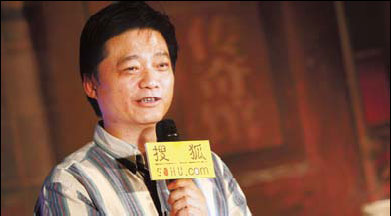Giving war survivors the final word
By Liu Wei (China Daily)
Updated: 2010-08-19 09:49
 |
Large Medium Small |

Cui Yongyuan has said a lot during his 14-year TV hosting career. Now, he's ready to let others do the talking.
His 32-episode documentary series My Own Kangzhan chronicles the experiences of individuals swept up in the War of Resistance against Japanese Aggression (1937-45), known as Kangzhan in Chinese, through interviews with 3,500 survivors, 3 million photographs and 50,000 hours of video.
"The people who've been ignored in this grand historical narrative play leading roles in this series," the 47-year-old says.
"History textbooks only tell us that Chinese people won the war through a united effort, but the details of every individual's life during those eight years is unique."
The episode entitled The Victory, for instance, tells the story of a soldier whom the Japanese had sentenced to death. He was to be executed on Aug 14, 1945, but his executioner got drunk and arrived late, so his hanging was postponed for the next day.
Japan surrendered the next day, and his life was saved. He now celebrates Aug 15 as his birthday.
In The Moon of the Marco Polo Bridge, an elderly man recalls the summer day in 1937 when he discovered a sword in a river. The young boy showed the weapon off to his friends, but when his father learned his son had found it, he gave it to soldiers staying in their hometown, Wanping - where the war broke out on July 7, 1937.
At the time, the boy didn't understand why his father had taken away his toy. But the experience remains his first memory of the war that changed his life.
The average age of the series' interviewees is 85, and it was the first and possibly last time for most of them to be interviewed.
Two of the three speakers in one episode have already passed away.
Cui and his team have been acting like a research institute, storing all materials in a digital database and spending an entire year trying to persuade one of the interviewees to give his testimony. He hopes to create an archive that anyone can access for free to find information about the war.
"After we grow old and leave this world, the database will remain young and continue to be updated," he says.
"Students can reference it for their essays and filmmakers can use it when creating their movies."
Cui and the documentary's director, Cao Hairuo, decided from the outset to hone the presentation to appeal to younger audiences. They developed three criteria to this end - captivating storylines, cartoon animation and potent emotionalism.
They hope youths will feel as if they were listening to 32 engaging stories told by their grandparents, Cui says.
"It presents an opportunity for young people to engage in dialogue with their ancestors," he says.
"If you can talk to Confucius, why would you listen to Yu Dan?" (Yu is a professor who rose to fame by interpreting Confucius' works on TV).
Cui's friend, renowned filmmaker Jiang Wen, believes the documentary shows the true essence of war.
"Usually, the stories of war are those of the big shots, but this story is one of ordinary people," he says.
"The big shots' ideas are realized through common people's sacrifices That's what I see war really is."
But despite the massiveness of the My Own Kangzhan undertaking, the series is actually only a small side project of Cui's oral history quest.
He has spent eight years and more than 100 million yuan ($14.7 million) of his own money and donations, leading four teams to gather materials on four subjects - cinema, war, diplomacy and the history of the People's Republic of China. My Own Kangzhan is merely one war of many tackled in Cui's oral history research.
Cui says the research has been his saving grace. The former CCTV talk show host was diagnosed with depression in 2001 - a gift in disguise, he says, because it pushed him outside of the routine of celebrity life. He says he had grown weary of pretending to be a slick and sly persona, which is far from his true character.
His doctor suggested he do something he really loves to overcome his gloomy feelings. So he turned to his two childhood obsessions - cinema and history.
In addition to My Own Kangzhan, he has completed a documentary series about old Chinese films and also opened a museum showcasing movies, projectors and props.
Having completed that project, he is now turning his attention to history.
"The country does not respect history, so it often repeats its mistakes," he says.
Cao adds that oral histories can be inaccurate.
"But they do have truthful elements, and piecing the details together creates a larger picture of historical reality."
The show is now being broadcast on the Web portal Sohu and will air on TV in November.